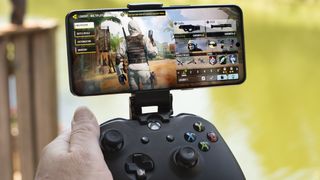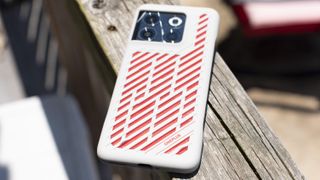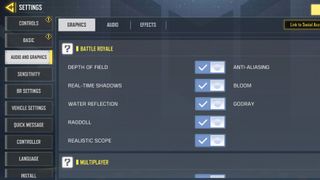How I dominated Call of Duty thanks to the OnePlus 10T
It's obvious who's using old gear

Although I’m a big fan of console games, even the best mobile games have had too many sticking points for me – until now. Today I picked up the OnePlus 10T, a review unit from OnePlus, and dedicated myself to Call of Duty.
I’ve played tons of shooters, and though I’m not great at online multiplayer games, I can always score a few kills. By comparison, before today I’d never enjoyed gaming on a mobile device as much as this; it helped that I was simply crushing it, too.
I have three big problems with console-style FPS titles on a mobile device, and judging by my competition today, I think a lot of people have the same problems.
Games on phones have control issues
The first is control. Console controllers can be kludgy, but they also manage to deftly arrange two dozen buttons at your fingertips so that you can perform a plethora of actions without looking.
Mobile games rely on the screen – you know, the place you need to look to see what's happening in the game. Mobile games expect you to block your view of everything and perform tasks just as you would with a handheld controller. You need to dance your fingers over virtual buttons, some clear and some obscure, while the game comes rushing at you – typically at 60fps (frames per second) or faster.

Despite being the accepted way in which FPS titles are played on mobile, it never sat right with me, so the first thing I did was to pair my Xbox controller with my OnePlus 10T. Nowadays, modern Android phones and iPhones can simply recognize an Xbox or a PlayStation controller without issue, making playing with a gamepad on your phone far more accessible than it once was. Many games are built with the correct button mapping pre-loaded too.
The OnePlus 10T was perfectly responsive with the Xbox sticks. I played for a couple of hours straight and never noticed a significant heat increase. I have the Glacier Mat case – purported to dissipate heat nicely – a go too and I never felt even uncomfortably warm holding the OnePlus 10T after a long gaming session.
Get the best Black Friday deals direct to your inbox, plus news, reviews, and more.
Sign up to be the first to know about unmissable Black Friday deals on top tech, plus get all your favorite TechRadar content.

Call of Duty knows a great gaming phone
My second problem is with graphical quality. Sure, console games don’t look as good as a PC game on high-end hardware, but I don’t own a great PC, so console games have always been my cutting-edge platform of choice. Based on memory, the current generation of mobile games offers what seems like similar visual fidelity to a PlayStation 2 or Nintendo's GameCube.
Thank the maker for gaming phones (and check out our list of the best gaming phones you can buy). Now that gaming phones have earned a spot in the market, developers have started including the same graphical tuning options we’ve long found on PC games. You can adjust the quality in general, or tweak specific settings, like texture fidelity and draw distance to best suit the ability of your device.

With the OnePlus 10T, I cranked every setting up to the maximum and ran the smoothest Call of Duty Mobile matches I’ve ever played, with no hint of a stutter or stumble. Graphics set to Very High; frame rate set to Max. Every possible checkbox checked.
This makes a huge difference when gaming on mobile. I was able to land hits from much farther away because I had a sharp, clear view of enemies in the distance. I was able to move quickly through buildings, checking corners and blind spots, thanks to the superior frame rate capabilities and the dual-stick handling of my Xbox controller.
Playing with the OnePlus 10T felt like real gaming
In other words, I was able to play and enjoy the game the way I would on a console. I didn’t feel like I was sacrificing my swift and intuitive controls, or my immersive graphics.
There was one final piece that truly helped me win, though; between the bleeding-edge Qualcomm Snapdragon 8 Plus Gen 1, the 16GB of RAM and the super-fast FiOS connection I was linked to over WiFi, I simply couldn’t make the OnePlus 10T stutter, and that was a real confidence-booster going into each match.
You can tell when playing Call of Duty Mobile who is playing with a competent rig and who is playing on a busted old LG phone. I would face down a small team of combatants and patiently pick them off, aiming carefully to save ammunition, while avatars before me bumbled and swayed. Whatever phones those people were using, they clearly couldn't keep up, and I took advantage.
I did not just win at Call of Duty, I destroyed
This happened over and over again. I did not just win at Call of Duty, I destroyed the competition. I won the MVP title every time I played a ranked match. I scored 20 or more points higher than any other player. My teams always won, and usually by a massive score margin.
The only times I lost, my opponents were wearing customized gear color-coordinated to their weaponry. These were clearly experienced players, and the OnePlus couldn’t give me enough of a technical advantage to beat them without practice.
So, the OnePlus 10T doesn't work miracles. For all the advantages and differences the tailored hardware and control setup offered, when I got schooled by a more experienced player on mobile it felt just the same as on console.

Phil Berne is a preeminent voice in consumer electronics reviews, starting more than 20 years ago at eTown.com. Phil has written for Engadget, The Verge, PC Mag, Digital Trends, Slashgear, TechRadar, AndroidCentral, and was Editor-in-Chief of the sadly-defunct infoSync. Phil holds an entirely useful M.A. in Cultural Theory from Carnegie Mellon University. He sang in numerous college a cappella groups.
Phil did a stint at Samsung Mobile, leading reviews for the PR team and writing crisis communications until he left in 2017. He worked at an Apple Store near Boston, MA, at the height of iPod popularity. Phil is certified in Google AI Essentials. He has a High School English teaching license (and years of teaching experience) and is a Red Cross certified Lifeguard. His passion is the democratizing power of mobile technology. Before AI came along he was totally sure the next big thing would be something we wear on our faces.